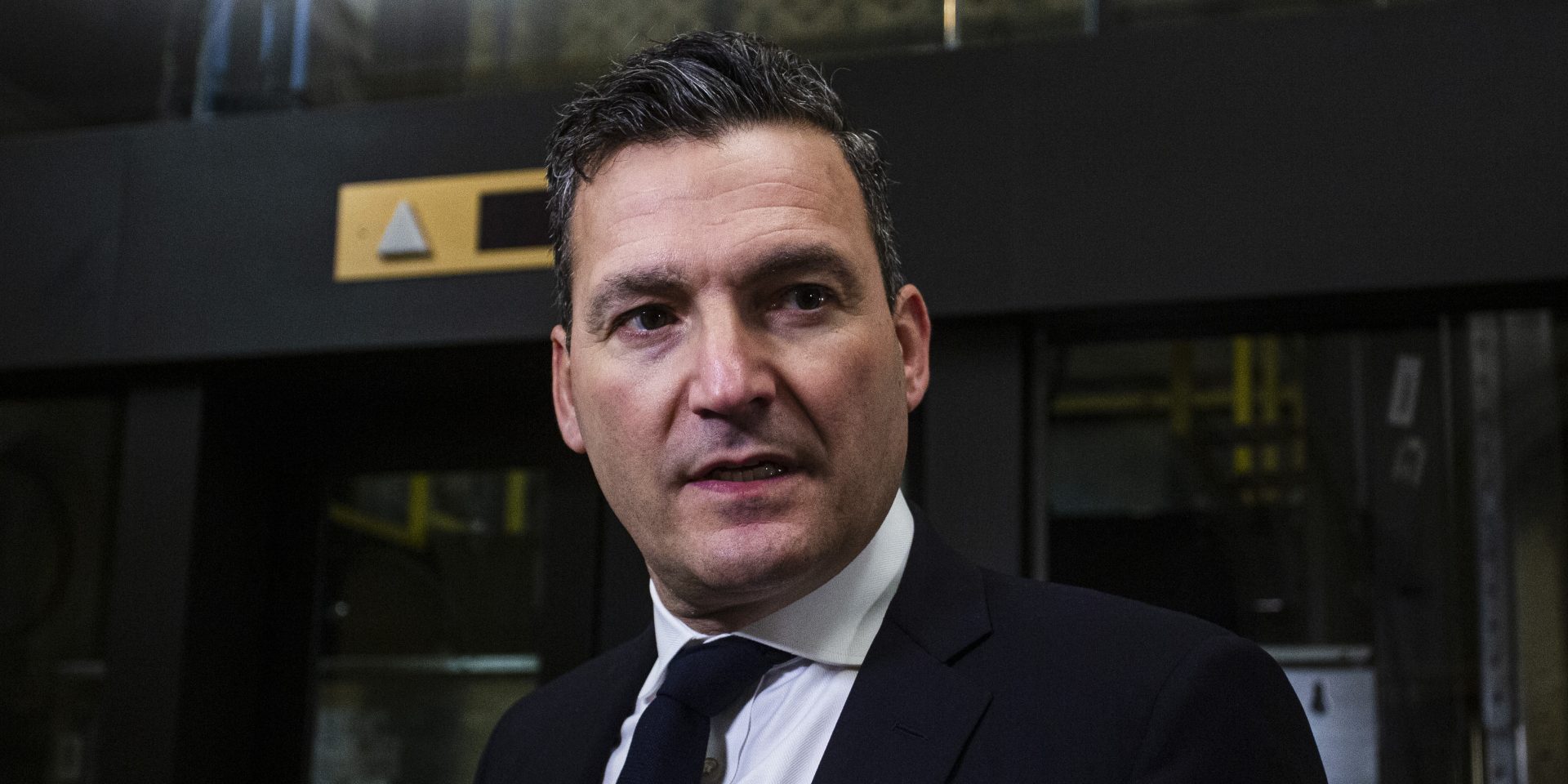Public servants urge data sovereignty in recent survey, while AI minister says ‘data isn’t gold in Fort Knox’

Canada’s minister of artificial intelligence says the government needs to grow its capacity to store highly sensitive data inside the country, but will continue to use the data storage infrastructure of American-based tech giants in some cases, while a new survey shows public servants fear that a lack of data sovereignty may contribute to the public’s distrust of the new technology.
“Data is not gold in Fort Knox where you lock it up,” Minister Evan Solomon (Toronto Centre, Ont.) told reporters at All In, an event in Montreal dedicated to artificial intelligence, on Sept. 24. “There has to be use cases for it.”
Solomon mapped out three different scenarios for how data should be stored: a “highly secure, totally sovereign” storage system for highly sensitive and top secret government data; a storage system for “public” data; and a “hybrid model” that blends the two.
He acknowledged Canadians are “concerned” about the storage of sensitive data related to their health and finances, among other personal topics.
“So how do we make sure that information stored is under Canadian law, and yet we’re still trading with the world?” Solomon said. “We need to use those American companies.”
As the Canadian government begins adopting AI tools among daily work practices, with many departments encouraging both public servants and the public to take part, it still relies—at least in part—on United States-based tech giants like Google, Microsoft, and Amazon for cloud storage.
Prime Minister Mark Carney (Nepean, Ont.) has promoted the idea of building Canada’s own sovereign cloud, saying in early September that such a project would “build compute capacity and data centres that we need to underpin Canada’s competitiveness, to protect our security and to boost our independence and sovereignty.”
Under U.S. law, data hosted on servers owned by American companies could be turned over to U.S. law enforcement upon request.
Public servants feel strongly that data used in large language models (LLMs) must be stored within Canada, and fear that a lack of data sovereignty may contribute to the public’s distrust of AI, according to results from a recent survey about AI use in the public service.
Ninety-four per cent of public servants surveyed this summer by KMPG in Canada say citizens’ data must be stored within Canada, and 86 per cent worry that public trust is eroding if such data is stored outside of the country. Additionally, 87 per cent say more must be done to establish and provide incentives for private industries—like large cloud service providers—to ensure sensitive or personal citizen data remains within Canada.
The results come from a nationwide survey of 349 public servants in federal, provincial, and municipal governments. Of the respondents to the survey, which targeted leaders and senior professionals, 41 per cent work for the federal government, 29 per cent for provincial governments, and 24 per cent work for municipalities, with the remaining six per cent employed at Crown corporations.
Ven Adamov, a partner and data analytics leader with KPMG in Canada, said there is a drive for this country to build its own sovereign cloud infrastructure to safely host and store Canadian data.

“We can see the world today is in quite a boiling point,” which highlights the importance of sovereign cloud, and the ability to control digital infrastructure and data, Adamov told The Hill Times.
“Just like critical physical infrastructure, so we have critical data infrastructure, in the digital domain,” Adamov said.
“Do we have complete control over those [American] companies? We don’t. They’re foreign companies. They’re big companies. I think there is a drive within the federal government to start working with Canadian providers.”
Shared Services Canada (SSC) is the department responsible for much of the information technology infrastructure across the federal public service. SSC provided The Hill Times with a list of six AI models used within the department, three of which are processed in Canada, and three of which are processed in the U.S.
When SSC uses LLMs in generative AI, the data is stored in an SSC-certified cloud data centre, “adhering to stringent policy and legislative requirements for security and privacy of data,” said spokesperson Nick Wells via email.
He said the department launched its own generative AI chatbot to assist its own employees, and the tool “adheres to [Government of Canada] policies and standards while enhancing Canada’s digital sovereignty,” but some process requests outside of the country.
“Models hosted outside of Canada are clearly identified, ensuring CANChat users are informed about the model location and can select the most suitable model for their task. All of this is done within a controlled environment that ensures appropriate security and data integrity,” said Wells.
While the department’s data is stored in an SSC-certified cloud service provider in Canada, “SSC cannot speak to the location of LLMs used by other departments.”

Wells said SSC recently launched a “request for information” to explore a sovereign cloud option with domestic providers to “complement existing hosting solutions and further strengthen Canada’s digital sovereignty.”
Additionally, the department has also begun the procurement process for “next-generation High Performance Computing systems,” he said. These systems “will underpin sovereign AI capabilities by securely scaling AI workloads across Canadian-operated environments, ensuring that sensitive data remains protected and under Canadian control.”
Earlier this summer, the federal government signed an agreement with Canadian AI firm Cohere to identify where AI can be used to improve the public service.
Sofia Ouslis, a spokesperson for Solomon, said the agreement “emphasizes the importance of privacy, security, and digital sovereignty, and any future use of government data would be subject to strict safeguards and compliance with federal data governance standards.”
Adamov said AI carries risks because the models mimic how humans operate, simulating “the breadth, depth, variety of human output in terms of speech, code, video, audio generation.”
Aside from data sovereignty, Adamov said widespread use of AI in the government and public service is associated with different risks, including privacy and security breaches and fights over intellectual property rights, as well as cyberattacks, misinformation, and disinformation.
“That will be one of the biggest [issues] in the public sector when we talk about policy and political process,” along with “the risk of privacy and security, information being put into public bots that can be included in bots training, retained by the bots or those behind them, is one of those biggest risks,” he said.
AI anxiety is real, survey says
Just under 70 per cent of the survey’s respondents reported anxieties surrounding the use of AI within their organization, with concerns ranging from job security and ethical dilemmas to privacy, fake content, deepfakes, and disinformation
Additionally, 77 per cent of respondents said they fear “losing control over the AI system and the results of its work.”
Adamov said he believes a lot of anxiety stems from the fact that AI is a novel technology, and the level of understanding among the general public is low. And while data scientists may have a better view of the future of AI, “even they cannot predict exactly where the technology will go, how it will impact everyone’s lives,” he said, adding “but that’s the case for any emerging technology.”
Anxiety also stems from the breakneck pace of AI technological developments, he said, with models able to “write new code and create new solutions in the blink of an eye, so to speak, as opposed to what a human would take to develop.”
“To me, the anxiety comes mostly from misunderstanding, or a lack of understanding and awareness as to the possibilities that these technologies can provide,” Adamov said, likening the new technology to the way computers and smartphones reshaped daily life and work habits.
“There is a level of anxiety each time when new technology comes around,” he said. “We had the same level of anxiety and turmoil when machines appeared in the manufacturing process in the 1800s, right?”
mglass@hilltimes.com
The Hill Times






 LICENSING
LICENSING PODCAST
PODCAST ALERTS
ALERTS













